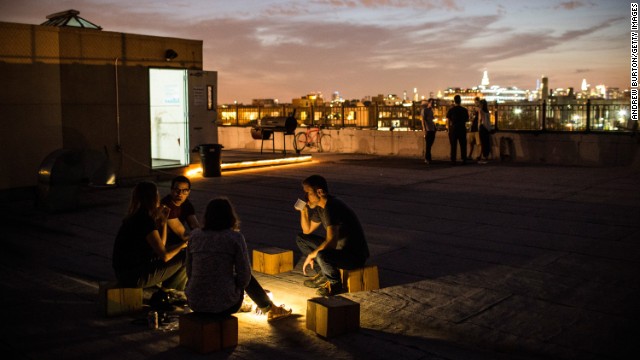- Back to Home »
- Why I live tweeted #roofbreakup

- Elan Gale, producer of "The Bachelor," is under heat for his live-tweet-turned-hoax
- Kyle Ayers: Fiction aside, it is OK to post other people's conversations on Twitter
- He says there's no harm as long as the personal identities of the people are anonymous
- Ayers: A story with no specific names attached is no less fake than fiction
Editor's note: Kyle Ayers is a comedian and writer living in Brooklyn, New York. He posts essays, videos and other work on his website.
(CNN) -- Elan Gale, producer of "The Bachelor," is under heat for his live-tweet-turned-hoax aboard US Airways over Thanksgiving weekend. His live tweets about a feud with a disgruntled passenger went viral and garnered him tons of attention and sympathy.
Turned out the whole thing was made up. Gale admitted it on Twitter. Should Gale not have made up the woman in 7a whom he called Diane? Maybe. But then again he's in the creative industry. He's a writer.
I conclude by saying hopefully a few people got a few laughs over a slow Thanksgiving weekend
— elan gale (@theyearofelan) December 3, 2013 To me, what's more fascinating is how quick we are to jump on any interesting human interaction. Gale conceived of a short story on Twitter and it was so good that hungry media outlets seized on it and spread the story like wildfire.
If Gale wanted publicity, he got it. If the media wanted a good and verified story, it should have done its job of fact-checking.

Gale just happened to live-tweet a fiction. But the bigger issue is: Is it OK to live-tweet other people's conversations?
Based on my own experiences, I'd say yes, to an extent.
A few weeks ago, it was an unusually warm night in Brooklyn. I had a friend in town and we went up to the roof to enjoy the view. More groups of people came up and cluttered the smallish space.
Suddenly a couple burst on to the roof. Simply put, they began breaking up on the roof, in front of everyone. It all seemed so familiar to me, the back and forth, the arguing between the couple. I'll tweet out what they're saying, I thought. I didn't think too much about it. It just seemed like a relatable situation.
A couple is breaking up on my roof right now. I was just trying to enjoy the view. Now I will live tweet the breakup. #roofbreakup
— Kyle Ayers (@kyleayers) November 17, 2013
"Do you see yourself living with me within a year?" -girl #roofbreakup
— Kyle Ayers (@kyleayers) November 17, 2013
"I can't think in terms of like, time and shit, Rachel." -guy #roofbreakup
— Kyle Ayers (@kyleayers) November 17, 2013
"Do you love me?" -girl (OH BOY HERE WE GO, PEOPLE) #roofbreakup
— Kyle Ayers (@kyleayers) November 17, 2013
"Look I'm not a guy who's into labels, Rachel. You knew that getting in." -guy #roofbreakup
— Kyle Ayers (@kyleayers) November 17, 2013
"I can't do this. You're a waste of my time." -girl #roofbreakup
— Kyle Ayers (@kyleayers) November 17, 2013
"Are we getting pizza or what? I don't mean to change the subject but are we?" -guy #roofbreakup
— Kyle Ayers (@kyleayers) November 17, 2013 The breakup, #roofbreakup as it became known, started to pick up steam, and eventually went viral. I began to receive messages and tweets and e-mails from all over the world, with the overwhelming majority expressing their delight and joy in reading the tweet-sized transcript.
But not everyone condones this behavior. Nisha Chittal, a social media content editor at MSNBC, posted an essay on Medium entitled, "Please stop live-tweeting people's private conversations."
Chittal mentions my #roofbreakup, Gale's airplane feud (before it was revealed to be a hoax), a date someone overheard on Amtrak, and the time where Tom Matzzie overheard former NSA director Michael Hayden's phone conversation with reporters. Chittal says she believes it to be "unethical and unfair to regular people to broadcast their lives to an audience against their will."
She's right in some ways. However, except in the case of Michael Hayden, the people in her examples are anonymous. They just as easily could have been fiction, as in the case of Gale's airplane feud, where the characters existed in an invented scenario to evoke people's sympathy.
But there is no harm if a conversation with universal appeal is shared publicly as long as the people remain anonymous.
For example, with my own live-tweeting of #roofbreakup, I didn't give any clues as to who the couple were. When sifting through the endless responses sent my way in the wake of #roofbreakup, time and time again I came across "oh I've been there before" and "sounds like my last breakup." The only explanation for the level of exposure that my #roofbreakup got is that people connected with the situation.
It was gossiping in the 21st century, except instead of using specifics and pointing out the people, it remained "guy" and "Rachel."
I didn't live-tweet a couple's private conversation; I live-tweeted any two people's breakup conversation.
Technology is quickly changing our lives and we are adapting accordingly. It's so easy to communicate and share information and knowledge instantly. And now we have to deal with having private conversations in public spaces. But private and public are not always distinctly drawn lines. Sometimes the two mesh and things get blurry.
As humans, we're intrigued with the lives of other people. When other people's lives parallel ours, we feel less alone in the world.
The media knows this. Just as often as you read a headline about a natural disaster, you will see a headline about a personal disaster. Elaborate proposal videos go viral daily. Couples fighting in public get on YouTube.
Go ahead and share the story you overheard on the street or cafe, just make sure to not give away the personal identities. A story with no specific names attached is no less fake than fiction.
You may wonder: Did the #roofbreakup really happen? You can believe me or not, but I promise you it did.
Had I witnessed the breakup on my roof five or six years ago, I would have told everyone I knew about the crazy exchange. I would have walked back into my apartment and re-enacted it for my then roommates, embellishing and recalling every line I possibly could.
But I witnessed the breakup in 2013, and I communicated it in a way that seemed just as normal as any other. It just happens that I can tell the story to more people.
Follow @CNNOpinion on Twitter .
Join us at Facebook/CNNOpinion .
The opinions expressed in this commentary are solely those of Kyle Ayers.







